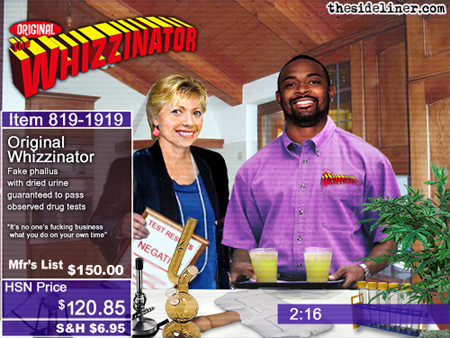
The manufacturers of the Whizzinator, a male prosthetic urinary device used to pass anti-doping steroid testing and employer drug testing, pleaded guilty to conspiracy to sell drug paraphernalia. United States Attorney Mary Beth Buchanan prosecuted Gerald Wills and Robert D. Catalano of Puck Technology as part of Operation True Test that targeted companies who manufacturer products intended to “mask” illegal drug use and/or anabolic steroid use in athletes (“Men who sold ‘Whizzinator’ admit to federal charges,” November 26).
Mary Beth Buchanan is the “porn and bongs” prosecutor who spent $12 million to put Tommy Chong in prison for nine months for selling pipes and bongs as part of Operation Pipe Dreams and Operation Head Hunter, has turned her attention to anti-doping detection devices even though federal law does not explicitly prohibit the use of such “masking products.”
The federal anti-doping law entitled Drug Testing Integrity Act of 2005 was introduced in response to Minnesota Vikings running back Onterrio Smith’s detention by airport police due to the discovery of the Whizzinator. The bill specifically criminalized the use of such items but failed to gather momentum (“Whitfield, Engel Introduce National Drug Testing Integrity Act,” May 9, 2006).
The devastating effects of drug and steroid use are well known and we should not allow companies to sell products like the Whizzinator to falsify their tests with impunity. These devices should not be sold legally in the United States and this legislation will make our nation a safer place to live.
Even though the legislation did not pass, Mary Beth Buchanan, the aggressive obscenity prosecutor and vice hunter, nonetheless decided to pursue Puck Technology and Whizzinator under the rarely enforced federal drug paraphernalia laws much as she did with the case against Tomy Chong and Nice Dream Enterprises; many critics (and federal prosecutors) regard the pursuit of obscenity and paraphernalia cases as a waste of money that diverts significant resources away from other more serious crimes. (“Buchanan picks new target: products that mask drug use,” May 11, 2008).
But critics, including comedian Tommy Chong, whom Ms. Buchanan prosecuted as part of Operation Pipe Dreams, say this is just another example of a frivolous prosecution and misplaced priorities.
“The terrorists crash into her area, and she’s concentrating on porn and bongs,” Mr. Chong said, referring to the Sept. 11, 2001, crash of United Flight 93 in Somerset County. “That kind of tells you the direction she’s headed.”
An attorney for Spectrum Labs, a company that manufacturers the drug/steroid masking product called Urine Luck, does not believe that paraphernalia laws apply to masking products.
Some have said that such products fall under federal drug paraphernalia laws, but Ms. Kinsley strongly disagrees.
Under the U.S. Criminal Code, drug paraphernalia are defined as “any equipment, product, or material of any kind which is primarily intended or designed for use in manufacturing, compounding, converting, concealing, producing, processing, preparing, injecting, ingesting, inhaling or otherwise introducing into the human body a controlled substance.”
Ms. Kinsley does not believe that definition applies to her client’s products, and she thinks that Congress agrees with her — otherwise there wouldn’t have been a movement to create a new law to address masking products.
The attorney representing the manufacturers of the Whizzinator originally rejected the possibility that the government could apply paraphernalia laws to the Whizzinator.
Lawyer Stanton D. Levenson, who represents Mr. Chong and the company that makes The Whizzinator, said he also has heard the government is trying to make a paraphernalia case, “which just blows my mind.
“We’re ready to do battle with them,” he said. “There’s no way this is a paraphernalia case.”
However, attorney Stanton Levenson apparently changed his mind once the plea agreement was reached (“‘Whizzinator’ makers to plead guilty,” October 15).
Mr. Levenson said he did research that showed his earlier opinion was wrong.
“We’re convinced that the government’s theory is correct, and the government has a case,” he said. “Obviously, it’s serious if somebody is faking drug tests who is then driving a tractor-trailer or a bus or flying an airplane.”
Radley Balko of Reason explains how federal conspiracy laws were used to obtain convictions in the absence of specific federal laws that make the sale of masking products illegal (“Mary, Mary, Why You Buggin’?,” May 21).
There’s no specific federal law criminalizing the sale of masking products, and none of the sites raided by federal agents were actually in Buchanan’s district. My guess is that she’s likely to charge manufacturers who ship the products into states that do have broad drug paraphernalia laws, or that have specific laws against masking products, under federal conspiracy statutes.
Federal definition of drug paraphernalia:
The term “drug paraphernalia” means any equipment, product, or material of any kind which is primarily intended or designed for use in manufacturing, compounding, converting, concealing, producing, processing, preparing, injecting, ingesting, inhaling, or otherwise introducing into the human body a controlled substance, possession of which is unlawful under this subchapter.

About the author
Millard writes about anabolic steroids and performance enhancing drugs and their use and impact in sport and society. He discusses the medical and non-medical uses of anabolic-androgenic steroids while advocating a harm reduction approach to steroid education.

Leave a Reply
You must be logged in to post a comment.